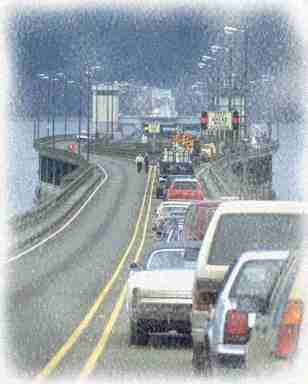|
At
Friends of the Earth, we have joined hands with conservative
taxpayer groups and community activists across the nation to go
directly to the root of the problem with many unneeded and unwise
roadways. Our Road to
Ruin report
highlights proposed federal highway projects across the country that
will waste not only taxpayer money but also existing community
harmony. "If we can get policy-makers to consider how transportation
money is spent, not just how much money is spent," says Friends of
the Earth Transportation Policy Coordinator David Hirsch, "we can
make real progress in moving beyond the vicious cycle of
road-building and sprawl."
We're fighting the wasteful
federal subsidies that spread our road-building frenzy into national
forests, and we've battled the powerful interests that want to
render federal highway spending immune to the pressures of federal
budget-balancing compromises. With the Surface Transportation Policy
Project and others, Friends of the Earth is working for sound
legislation to reauthorize the federal Intermodal Surface
Transportation Efficiency Act (ISTEA), the major transportation
funding law.
On this score, the key principles are balance --
to expand the range of transportation choices available to Americans
-- and local control - to put community vision and democracy ahead
of blind roadway engineering. Over the years, activists and city
planners have won modest flexibility that allows for
non-auto-centered expenditures of federal gas tax revenues, and now
is the time to press for more such spending to support mass transit
and other auto alternatives.
Friends of the Earth also
understands that transportation policy is made, not only in
Congressional public works committees but also in the taxation
committees of Congress and of state legislatures. In that area, we
have worked to make sure that the federal tax code does not favor
employer-paid parking benefits over transit benefits. And we have
traveled to New England to press a pollution and energy tax as a
viable alternative to the State of Vermont's property tax
system.
On a federal level, we have joined with groups like
the Land Trust Alliance to press for tax code changes that promote
sound land management and reduce the pressures for sprawl
development. We have urged Congress to model estate tax reform after
provisions of bills such as the Family Forest Preservation Tax Act,
the American Farm Protection Act and the Federal Open Space
Acquisition and Preservation Act.
Clearly the recipe for a
less-sprawling and more sustainable future is a complex mixture:
hard-nosed activism, local organizing, strategic cuts in
road-building budgets, improved planning, transit support and
dramatic changes in the state and federal tax systems that feed the
sprawl cycle. The agenda is an ambitious but important
one.
In the words of Louisville Mayor Jerry Abramson, "We
have exhausted the model of moving farther and farther from our
central cities." Now, according to the often-acerbic Kunstler,
"[w]hether we adore suburbia or not, we're going to have to live
differently." "Rather than being a tragedy," argues Kunstler, "this
is actually an extremely lucky situation, a wonderful opportunity,
because we are now free to redesign our everyday world in a way that
is going to make all classes of Americans much
happier."
|
|

